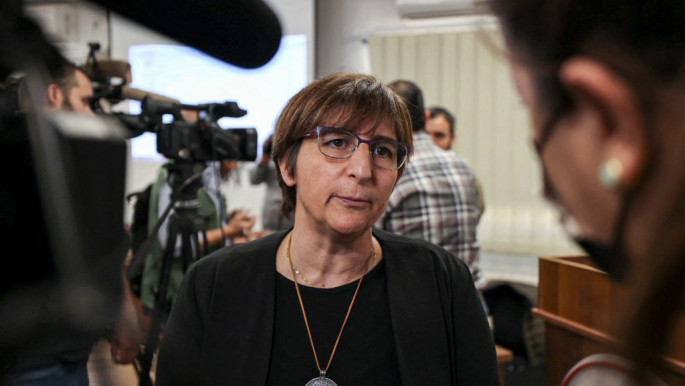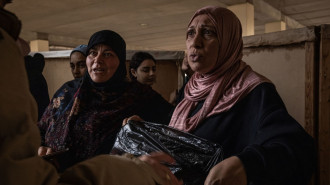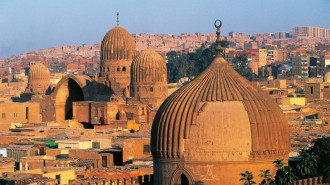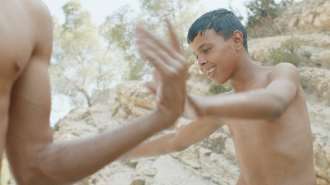
Palestinian NGOs banned by Israel continue their fight for truth

"Al-Haq means 'the truth', and so there's no denying the pursuit of the truth," says Wesam Ahmad, the head of the Centre for Applied International Law at Palestinian legal rights group Al-Haq.
He's just pulled up two photos on his phone. The first shows a metal plate sealing off the door to one of Al-Haq's offices in Ramallah, put there by Israeli forces during a raid in August.
The second shows the plate pried open just hours later, revealing the organisation's logo on a wall inside – the truth set free. The blockage had been removed by ordinary Palestinians, Wesam tells The New Arab.
"It gives you goosebumps, honestly," he says. "I think it is a reflection of the resilience of Palestinians in their pursuit of truth and justice that there's no steel plate that's gonna deny us from such a pursuit."
Banned
Al-Haq was one of seven Palestinian NGOs raided and left closure notices by Israel at their occupied West Bank offices early on 18 August. The organisations had all previously been banned by Israeli authorities.
More than 150 groups, including Human Rights Watch and the UK's Palestine Solidarity Campaign, together expressed their "full solidarity" following the raids.
Six of the banned organisations, including Al-Haq, prisoner support group Addameer and children's rights NGO Defense for Children International – Palestine (DCIP), were declared "terror organisations" last year.
Israeli authorities claim they are linked to the Popular Front for the Liberation of Palestine, a leftist political and armed faction. The NGOs deny the allegations against them, and their banning has drawn widespread international criticism.
The seventh group, the Health Work Committees (HWC), was outlawed in the West Bank by Israel in 2020. HWC board member Abeer Zarour says the Israeli claims against her organisation are "entirely false". The NGO's work complies with Palestinian law and is "publicly known and strictly social in the field of health care", she adds.
'It's a message'
Israeli forces confiscated files – including court documents – when they raided DCIP, accountability programme director Ayed Abu Eqtaish says.
He adds that this won't affect the group's ability to defend children in the Israeli military courts that Palestinians in the West Bank are subject to. This is since the documents can be requested again. So, why take them?
"It's a message for us" that Israel is following through on its banning of DCIP, Ayed says. "So, this is the next step. [It's] also to terrorise the staff of the organisation."
For Addameer, things were different. Director Sahar Francis says other NGOs had equipment taken or destroyed, but Israeli forces "did nothing" like that at her group's office. This leads her to believe they bugged Addameer's server, trying to hack emails and other communications.
"It's frightening because they will try to use all the communications, whether emails or posting anything [on]… social media or [on] our website as proof to be used in… court in the future against us," she says.
Sahar says Addameer – whose staff spent almost three weeks working elsewhere before returning to the office – performed the basic checks.
However, she doesn't believe the necessary experience and technology exists in Palestine to guarantee the group's security. "There's nothing that you can say, 'I am protected 100 percent,'" she adds. "We take this into consideration for sure."
"It's frightening because they will try to use all the communications, whether emails or posting anything [on]… social media or [on] our website as a proof to be used in… court in the future against us"
Al-Haq has also carried out the sweeps it can for listening and surveillance equipment with the technology available, Wesam says. "But we have nothing to hide anyway," he continues. "We're not gonna worry too much about what possible technological advancements they have made that would prevent us from being able to do our work."
What's next?
While the banned Palestinian NGOs continue with their missions, Israel could take further steps against them and their staff – from arrests to travel bans and beyond.
"There are so many things that they can do that, at least for me, I've decided to embrace the ambiguity and not worry myself about what all the possible things that they might do [are]," Wesam says. "That would put me in a state of paralysis and worry."
Though "the threat to be arrested is real", Sahar believes measures against individuals will be taken "slowly, slowly", depending on the level of public and international support.
She expects Israel will next try to apply pressure to banks and donors, an issue HWC has had to grapple with. "The military order to close us affected our funding, especially that banks have been pressured to restrict our accounts by the occupation authorities," Abeer says.
"There are so many things that they can do that, at least for me, I've decided to embrace the ambiguity and not worry myself about what all the possible things that they might do [are]"
She adds that the group's partners have rejected Israel's allegations and will continue to support HWC. "But bank restrictions have made it difficult for us to continue receiving funding, affecting our capacity to continue our activities."
Family
Whatever moves Israel decides to make, staff members' families will have to deal with the consequences.
Wesam is married and has three little children. "My wife knows more than my daughters, and I try not to discuss these issues around them [so as not] to raise their concern, but they are generally aware of what's happening," he says.
"They are also appreciative of the context and the nature of the work and recognise that what we are doing is challenging our oppressor and so our oppressor will naturally react towards us negatively."
Sahar is a Palestinian citizen of Israel. Her family lives outside the West Bank – in the Galilee region of Israel. "It makes it… even worse because they're not facing the current situation on [a] daily level," she says. She explains that people going through such circumstances in the West Bank or Gaza eventually normalise the abuses they experience.
Sahar's family is "so stressed", she says, and for a couple of weeks had wanted her to leave the country out of fear she could be arrested. "Not just leaving the occupied territories and going back to the Galilee, they wanted me to leave the whole country. And this is very stressful," Sahar adds.
Not giving up
"It's mostly about our advocacy and about our efforts in proving the war crimes and the crimes against humanity committed"
Faced with so much pressure from Israel, many would throw up their hands and give in – but not these Palestinian NGOs. Abeer says HWC will "continue to work and carry on with our duty despite difficulties".
DCIP is pressing on as usual because it is convinced its banning is "baseless" and that what it's doing is "lawful and legitimate", Ayed says.
Also pushing forwards is Addameer. "Our case is not disconnected from what's going on in the occupied territories," Sahar says, noting her organisation's work in providing prisoners legal representation.
Addameer has also become a "very trusted source for the international community", she adds, particularly for United Nations bodies, in terms of information and documentation.
"This is why we are so seriously attacked," she says. "It's mostly about our advocacy and efforts to prove the war crimes and the crimes against humanity committed."
For Wesam, Al-Haq, which was created in 1979 as the first Palestinian rights group, has a "strong symbolic value" within local civil society and the human rights space internationally. It's "too big to fail", he says, highlighting the work the organisation does and its legacy, among other things.
Israel "won't defeat" the seven Palestinian NGOs, Wesam vows. "We will keep going."
Featured image credit: ABBAS MOMANI/AFP via Getty Images
Qassam Muaddi contributed to this story.
Nick McAlpin is a journalist who has worked at The New Arab since March 2021. He holds a master's degree in social anthropology and a BA in French and Arabic. He lived in Jordan for a year during his undergraduate studies. Nick started his journalism career as a freelancer in 2019.
Follow him on Twitter: @NickGMcAlpin






![Palestinians mourned the victims of an Israeli strike on Deir al-Balah [Getty]](/sites/default/files/styles/image_684x385/public/2024-11/GettyImages-2182362043.jpg?h=199d8c1f&itok=xSHZFbmc)


![The law could be enforced against teachers without prior notice [Getty]](/sites/default/files/styles/image_684x385/public/2178740715.jpeg?h=a5f2f23a&itok=hnqrCS4x)
 Follow the Middle East's top stories in English at The New Arab on Google News
Follow the Middle East's top stories in English at The New Arab on Google News


